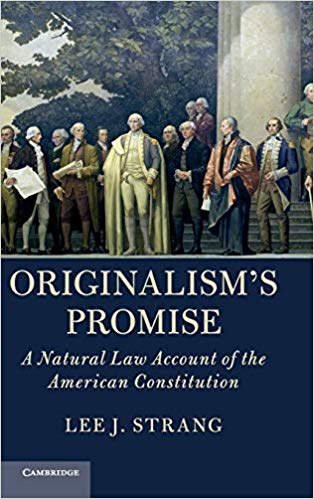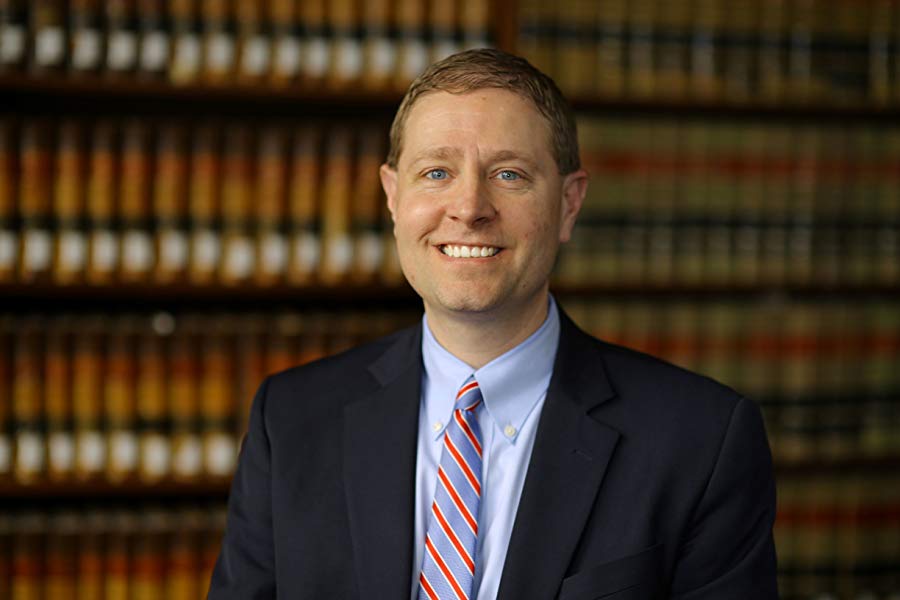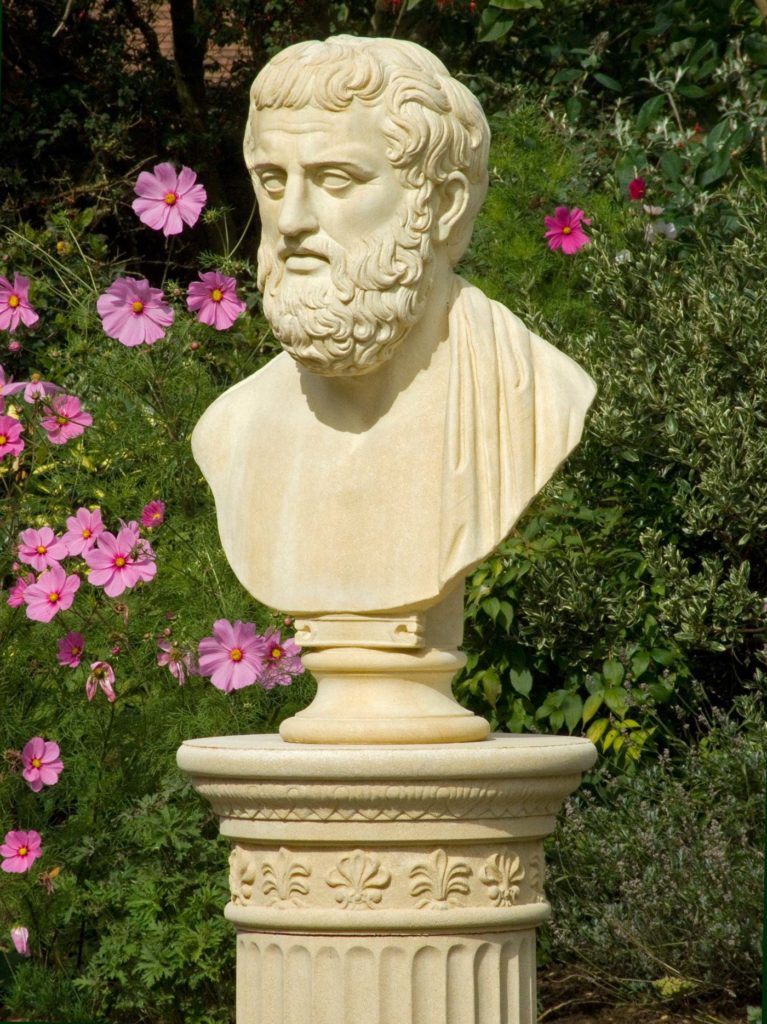An Original Case for Originalism
An originalist turns the tables on natural law theorists

A slightly revised version of this essay first appeared in Law & Liberty on December 17, 2019 (here), as “Originalism as a Model of Political Communication.” Thanks to How Appealing, Real Clear Policy (here), Real Clear Books (here), and The Originalism Blog (here).
Originalism’s Promise, Lee J. Strang’s ambitious new book from Cambridge University Press, was previewed at Law & Liberty a few months ago in a podcast entitled “Justifying Originalism.” In a wide-ranging conversation with Richard Reinsch, Strang hinted at the eclectic nature of his thesis, peppering the discussion with references to Aristotle, Jack Balkin, James Madison, Randy Barnett, Thomas Aquinas, Christopher Wolfe, Robert George, and John Finnis (as well as the familiar names of John McGinnis and Mike Rappaport). “Aristotle’s got a lot to say about Originalism,” he teased.

This is quite a diverse lineup, and fittingly so. Strang was a visiting scholar at Georgetown’s Center for the Constitution in 2015, and credits Barnett and Larry Solum for “generously commenting” on his arguments; Solum prominently blurbs the book, along with Princeton’s Keith Whittington. (Strang was a visiting fellow at Princeton’s James Madison Program during the 2018-19 academic year.) Yet Strang’s book, subtitled “A Natural Law Account of the American Constitution,” does not fall into any of the predictable “camps” that have formed among center-right constitutional scholars. Strang declines to “take sides” in the contentious internecine quarrels that have emerged between (for example) conservatives and libertarians, proponents of natural law and “positivists,” advocates of “judicial engagement” and those favoring judicial restraint, Straussians and everyone else, and so forth. [1]
Strang is aware of the myriad divisions and differences—he notes that originalism “is not monolithic” (surely an understatement), and that “originalists disagree on a lot”–but endeavors to reconcile (or at least defend) the many competing strains of originalism, which share the common belief that the Constitution’s original public meaning is its only legitimate and authoritative meaning. Judges should apply, and not invent, constitutional law. Strang’s nemesis is non-originalist theories of interpretation ushered in by the Progressive Movement and enabled by the critique of legal determinacy represented by Legal Realism. The Warren Court’s liberal activism generated a cottage industry of non-originalist scholarship in the legal academy justifying the notion of a malleable “living” Constitution serving as a cornucopia of progressive policy outcomes to be dispensed by unelected judges.
Responding to this trend, in the 1970s Robert Bork and Raoul Berger challenged the “living Constitution” paradigm and revived the originalist tradition (so argues Strang) that animated the Framers. Strang does a commendable job of summarizing and explaining the background of originalism. The early chapters of Originalism’s Promise are an excellent primer on the current state of originalism, and for readers who are not academic specialists in the field, the book offers a useful overview of the many variations and technical (and sometimes jargon-ridden) argot that characterize the burgeoning literature. What makes Strang’s book distinctive, and noteworthy, is that it goes beyond the doctrinal conventions of the genre and undertakes a philosophical defense of originalism—based on natural law principles. Strang claims to be the first scholar to offer a natural law justification for originalism.
Philosophical arguments of this sort tend to be the domain of political theorists rather than law professors, [2] but Strang is no stranger to the field. He studied under Richard Parker at Harvard and wrote his LL.M. thesis on Originalism and the Aristotelian Tradition. Strang asserts that “the Aristotelian philosophical tradition’s account of our Constitution requires federal judges to utilize originalism.” This is a novel argument; proponents of “natural law” —a powerful force in Catholic theology, and in moral philosophy generally—often advocate it as an alternative to originalism, which they sometimes deride as “positivism.” Strang turns the tables by arguing that originalism is not only compatible with natural law, it is compelled by it.
Strang anticipates that readers may be startled by his claim:
Many assume that a natural law account of the American Constitution must result in the judicial power to invalidate federal and state law through the use of unenumerated natural law or rights. As John Hart Ely famously (and critically) described this general perspective, “[t]he invitation to judges seems clear: seek constitutional values in—that is, overrule political officials on the basis of—the writings of good contemporary moral philosophers.”
Strang disagrees, and offers a closely-reasoned argument based on what he calls the Constitutional Communication Model—the Framers adopted the Constitution as a reasoned act of intentional lawmaking, which put in place mechanisms to coordinate relations among the branches and the polity to secure the common good. Strang posits that original intent, original meaning, and original methods “are not substantively distinct.” His model “conceives of the Constitution’s meaning as the primary mechanism of communication of the Constitution’s legal directives among the Framers, Ratifiers, officers, and American citizens.” Strang contends that honoring this arrangement, which he dubs the “law-as-coordination” approach, “is the most normatively attractive theory of constitutional interpretation because it is the one most likely to secure the common good of American society and individual Americans’ human flourishing.”
Philosophical arguments are necessarily abstract in nature (no pun intended), and Strang’s exposition is no exception. The theoretical sections are punctuated with frequent citations to John Finnis’s seminal Natural Law and Natural Rights (1980), [3] Aquinas’s Summa Theologica, and Aristotle’s The Nicomachean Ethics. Some constitutional law buffs may find such references off-putting, and sometimes impenetrable, but Strang’s general orientation is consistent with consequentialist defenses of originalism by McGinnis and Rappaport and others. Strang weaves natural law arguments (and related concepts, such as “virtue ethics”) throughout the book; it is risible to claim, as some critics have, that this material is simply tacked on to the end. The book is a combination of doctrinal and theoretical arguments, but natural law (central to chapter 4) is the keystone of Strang’s bold thesis.
The ultimate success of Strang’s natural law defense of originalism hinges on the case he makes in chapter 4, and in particular section 4.5. This reader was left with questions: How does one evaluate the strength of a normative argument that rests on the premise that originalism “best secures the background conditions under which Americans can pursue their own individual human flourishing”? Is “human flourishing” (which seems uncomfortably similar to Justice Kennedy’s “mystery passage”) [4] capable of objective measurement? Some originalists dispute whether originalism requires a normative justification at all. Some question whether natural law even has a role to play in a system of positive law.

Should Americans embrace an account of constitutional interpretation that (as Strang admits) is “agnostic” regarding its outcome? Is the “common good”—the objective of the Aristotelian philosophical tradition–in the eye of the beholder? (Strang admits that “there is a robust debate over different conceptions of the common good.”)“Old school” originalists in the mold of Robert Bork and Antonin Scalia would likely be skeptical of any reliance on moral philosophy as a guide to constitutional theory. “When did Aristotle become a Founding Father?”, they might ask, pointing out that judges are not philosophers or theologians, and vice versa.
Strang concedes that “these first principles of natural law are abstract; too abstract, in fact, to guide most concrete decision making, including legal decision making.” He relies instead on “a number of mediating structures to bridge the analytical gap” between abstract natural law norms and “the concrete practical situations typically faced by humans.” These structures include virtue ethics, specification, and determinatio. Strang, who is the John W. Stoepler Professor of Law and Values at the University of Toledo College of Law, does a yeoman’s job of explaining and applying these “structures” to defend originalism, but one wonders if justifying constitutional theory in the vernacular of moral philosophy creates unnecessary indeterminacy. I daresay that philosophers disagree among themselves even more than originalists do (which is a lot).
Many readers will find no quarrel with Strang’s analysis, but others may prefer Ronald Dworkin’s take (or Hadley Arkes’s, or Robert George’s, or John Rawls’s, or Harry Jaffa’s, etc.). Strang’s exploration of natural law as a justification of originalism is provocative, and certainly original, but not wholly convincing. If recent trends in constitutional scholarship are any indication, Originalism’s Promise represents only the first shot in what will become an extended volley, perhaps moving the academic debate in a new direction. Let the dialogue begin.
[1] In the podcast, referring to Steven Calabresi’s “originalist” defense of Obergefell, Strang ventured that “I frankly just don’t find those arguments persuasive at all.”
[2] Strang concedes that “this legal theory is relatively uncommon in the American legal academy.”
[3] Finnis was Neil Gorsuch’s mentor at Oxford, where the future Justice studied philosophy as a Marshall Scholar.
[4] See Planned Parenthood v. Casey, 505 U.S. 833, 851 (1992) (“At the heart of liberty is the right to define one’s own concept of existence, of meaning, of the universe, and of the mystery of human life.”).
































